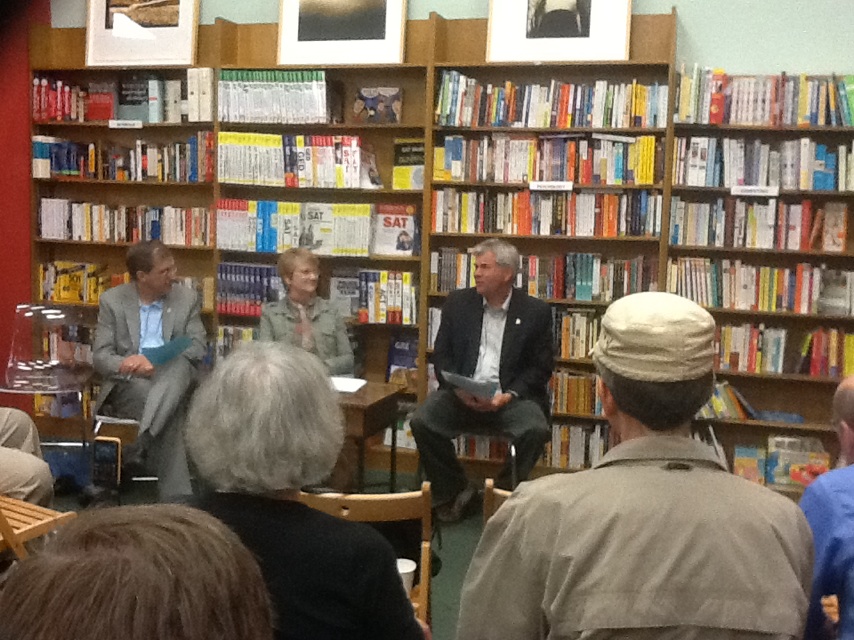
Part One – Overview of the Current Problem and Challenges – It was a small but intimate setting on what turned out to be a rainy Monday. Mayor Joe Krovoza and City Manager Steve Pinkerton came before between 20 and 25 members of the public at the Avid Reader to discuss the past, present and future of the budget.
Mayor Joe Krovoza said that their goal was to avoid the kind of sterile public budget workshops in “unattractive community buildings” with “public attendance almost non-existent” and welcomed the more friendly and intimate setting of the Avid Reader.
Mayor Krovoza described his first year in 2011-12, when “we were looking at structural deficits of $6 to $7 million on a general fund budget of $38 to $39 million. We were looking at huge, huge numbers.”
He said that they made some “short-term cuts” that were “very painful.” They closed the Community Park Pool, for example.
They realized to deal with the kinds of cuts they were looking at, they would be slashing all sorts of program. So they adopted a different approach.
“We decided we wanted city staff to find $2.5 million in cuts over the coming months to begin to get this right, otherwise we were really headed for an incredible train wreck,” he said.
At the same time, he said, they brought on Steve Pinkerton to be the next city manager. “We brought on Steve in part because he demonstrated during the interview process this incredible understanding of all the different things you can do on the revenue side and the expense side to fix our fiscal system,” he said. “We hired Steve and the first thing Steve told us about the budget was $2.5 million in that short a period of time, you guys are absolutely nuts. I can’t do it and I won’t do it.”
As a result they backed off a bit, but believes at that time they sent a very strong message.
 Mayor Krovoza also described the difficult decision that they made with regard to cutting fire staffing.
Mayor Krovoza also described the difficult decision that they made with regard to cutting fire staffing.
“That’s a lot of money we saved,” Mayor Krovoza stated noting that $440,000 year after year, adds up over time especially. “It comes with some anxiety about how we are going to maintain safety in the city. But it was also concurrent with all of the boundary drop with the university where we’re truly going to coordinate now with the two different fire units at the university.”
“We think that adding those two units and coordinating them with our operations,” he said, “there’s an argument that service is going to be better. I am hesitant to say that, but I think it will be the same with slightly different service coverage.”
It is worth noting that, during the public question section, the issue of fire staffing and public safety was not foremost on the minds of the public.
The big message delivered by both Mayor Krovoza and City Manager Steve Pinkerton was the impact of the non-investment in road infrastructure on the current city budget, along with the increasing costs of retiree health care into the future.
Mayor Krovoza noted that retiree health care costs were projected to soar from the current 20% of the budget up to nearly one-quarter at 24% of the budget. With the latest rounds of MOUs, he said, “We’ve brought it down to 17.75%.”
Both Mayor Krovoza and City Manager Steve Pinkerton expressed concerns about the retiree health care system, arguing that they do not believe it is solvent in the long term.
Mayor Krovoza concluded his introductory remarks, noting that if the city council does not get their arms around the budget and really figure out the nitty-gritty, they will not be able to spend money on the great projects that make this such a special community to live in.
Mr. Pinkerton described it as both really exciting and “a paradigm shift,” changing the way government functioned for the last 35 years. It functioned differently prior to 1978 and the passage of Prop 13, in that “we’ve been essentially limping along,” but at the city level we found a comfort level as to how to survive “in the perverse way that revenues flow from the state of California down to cities.”
With the changes in funding from the state, and the end of redevelopment, he said, “This is really a brave new world that we have to function in. I feel confident that with the characteristics of this community, we’re going to survive, we’re going to thrive. But changing from one system to the next is always painful.”
For him, “This budget signals that sea change for us.”
The big thing that’s happened over the last decade, besides the reduction in how much the state helps out the city, is the massive change in employee compensation and benefits.
There is a lot of talk about how we are going back to 1990 levels of employment. But City Manager Pinkerton noted that in 1990, while we had 375 employees, we had $16 million in payroll for all funds. $10 million of that was salary and $6 million was benefits.
At present, we are at $25 million in salary, which is a small reduction over the peak. That is an increase of 150% from 1990. But it is on benefits where the city has really taken the hit. On the benefits side, it has gone from $6 million up to $23 million a year for pensions, medical and retiree medical.
“Medical inflation is eating us alive,” Mr. Pinkerton remarked, noting that when these plans were set up back in the 1980s, when we were paying like $200 per month. Now it is $1800 per month for each retiree.
During that period, things had been going relatively well, but now revenue is largely flat. And while the city has managed to contain the salary costs, the ongoing costs and inflation on the medical and pension side is causing ever increasing problems.
One cannot talk about costs without talking about revenues. We have fairly flat revenue right now. On the property tax side, with the advent of Proposition 13, it holds steady on property taxes unless there is an exchange of property, so without a lot of sales and without growth, we are only seeing about a 2 to 3 percent increase in property tax.
In addition, Mr. Pinkerton pointed out that Davis lacks the big box outlets that are more consistent in terms of revenue flow. The city is instead highly dependent on auto sales. And those vary greatly year to year. For instance, last year there was a peak sales year for auto sales, and $1 million more in revenue than expected. Mr. Pinkerton warned however, that you cannot expect that increase to sustain itself and can’t be dependent on that level of sales for planning in the future.
One of the problems that the city faces is that its largest employer is UC Davis. While UC Davis does a lot of great things for the community, producing sales tax is not one of them.
The county also lacks a general sales tax on road. So we lack the ability right now to put money into roads. In the past, we got by because we have fewer square miles in roads than other towns.
We have had to rely on state and federal money to repair and maintain roadways. There is no local matching tax and the city made almost no investment into roads over the last decade. As we have mentioned, without that investment, the costs to maintain the roadways skyrockets far faster than almost all other measures.
The bottom line on pensions: “I think there have to be some changes in PERS, I don’t think it’s sustainable. There has to be some point in time where they’re going to have to start looking at changing the system, even for existing employees.”
He thinks and hopes that one of the bankruptcy cases coming before the courts will take care of this problem for us.
On the more hopeful side, “We have a council that has the nerve to take on these hard issues and address them and not pass them on to the next group.”
He said it was a really tough battle to get two-thirds of the employees to agree to the current plans where employees are paying more toward their pensions and medical than they were previously.
“Long run with where our revenues are going versus our expenditures, we’re going to continually have to find more creative ways to provide service with fewer and fewer employees each year,” he said. “Each time we lose a position (through retirement) we’re going to have to evaluate how can do that position in some other way.”
The revenues and expenditures will never catch up unless “we find a new and interesting way to do it.”
“With fire, we had some very low hanging fruit,” Mr. Pinkerton said. “We had a full-time professional fire department right across the street that we hadn’t been fully utilizing. They were more than happy to come in and join with us.”
He noted that, while the city has about 4400 calls per year, UC Davis has less than 1000.
“They were more than happy to cooperate with us and provide us with additional coverage, so essentially we improved our coverage by 50 percent at no additional cost,” he said.
He argued that those are the type of activities – sharing more services, with the university, county, other cities – which are critical things we need to look at.
—David M. Greenwald reporting
Normal 0 false false false EN-US X-NONE X-NONE

i am a bit concerned about how you get participatory budgeting when the public doesn’t seem engaged. the firefighters tried to rile people up, scare the crap out of them, and the public just yawned.